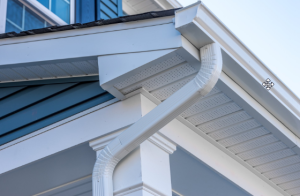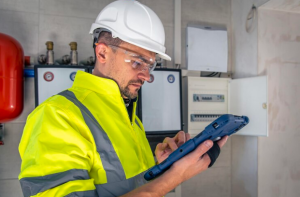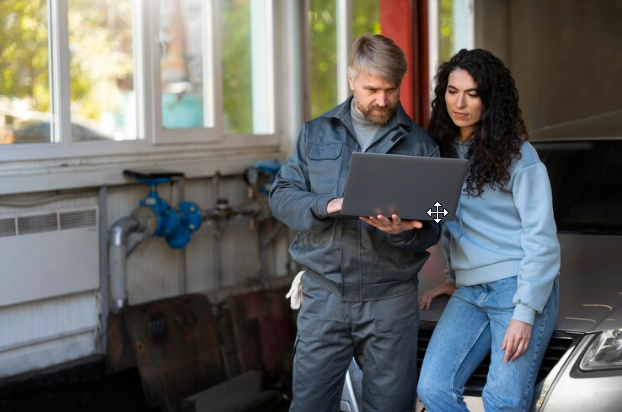Owning a commercial property is a significant investment that requires diligent care and attention. One of the key practices that commercial property owners should prioritize is regular inspections. These inspections serve as a proactive measure to identify potential issues, ensure the property’s safety, and maintain its overall value.

The Importance of Regular Property Inspections
Regular inspections of the building’s ramps and decks are vital to reducing potential hazards and adherence to safety regulations. Ensuring the use of the best screws for decking boards during inspections ensures smooth, clear, and safe walkways. In addition to addressing immediate safety concerns, regular inspections bring financial benefits by preventing expensive repairs and extending the lifespan of vital systems like HVAC and plumbing. These evaluations play a crucial role in enhancing tenant satisfaction, building positive relationships, and minimizing turnover. Embracing routine property inspections goes beyond being a strategic business practice; it signifies a commitment to responsible property management that yields dividends in the form of sustained property value, tenant contentment, and long-term loyalty.
The Consequences of Neglect
Neglecting regular property inspections can pave the way for a multitude of concerning issues that could significantly impact the quality of the property and its tenants. Structural deterioration, often hidden from plain sight, can silently compromise a building’s integrity, encompassing concerns like foundation cracks, water damage, and pest infestations. Safety hazards lurk without detection, from faulty wiring to outdated fire safety equipment, posing potential risks to tenants. Moisture-related problems, left unchecked, foster mold growth, leading to health concerns and property damage. The financial burden escalates as minor issues snowball into major repairs, impacting the property’s value. Compliance risks loom large, threatening legal complications and penalties due to non-adherence to safety standards. The absence of regular inspections can instigate a domino effect, ranging from structural vulnerabilities to financial, legal, and health-related repercussions, underscoring the critical importance of consistent property assessments.
Critical Areas for Inspection and Maintenance
Roofs and Gutters

Regular inspection and maintenance of a property’s roofs and gutters are critical aspects of preserving its structural integrity. The roof serves as the primary shield against weather elements, necessitating routine checks to detect issues like missing shingles or leaks that can lead to water damage. Simultaneously, well-maintained gutters play a crucial role in directing water away from the foundation, preventing stability-compromising clogs due to debris accumulation. Also ensure that gutters direct water away from any wooden elements to prevent damage and decay.
In addition to these measures, applying a waterproof wood sealer to wooden elements exposed to potential water runoff, can further protect against water damage and decay. This proactive step enhances the longevity and durability of the wooden components, ensuring they remain resilient to environmental factors and contributing to the overall maintenance of a property.
Beyond safeguarding the property’s foundational strength, proactive roof and gutter maintenance offer additional benefits. Efficiently functioning gutters, free from debris, not only prevent water accumulation around the foundation but also contribute to the overall sustainability of the property. By directing rainwater away from vulnerable areas, this practice helps reduce the risk of erosion and potential damage to landscaping. Moreover, maintaining a clear pathway for water drainage supports energy efficiency by mitigating the risk of water infiltration, which can compromise insulation and increase heating or cooling costs.
Plumbing and Drainage
Regular inspections of plumbing and drainage systems are crucial for maintaining a property’s integrity and functionality. Unaddressed plumbing issues can lead to severe consequences like water damage, mold growth, and structural problems. Systematic inspections, including checks for leaks and proper drainage, enable property owners to proactively identify and resolve potential plumbing issues early on, preventing their escalation into more significant and costly problems.
Moreover, adopting a proactive stance toward plumbing and drainage inspections significantly contributes to the overall functionality of the property. A well-maintained plumbing system ensures a smooth flow of water, preventing disruptions that might inconvenience occupants. Timely recognition and resolution of drainage issues also play a vital role in preventing water accumulation, a concern that, if disregarded, could compromise the structural integrity of the property’s foundation.
Electrical Systems
Regular inspections of electrical systems are paramount to the safety, functionality, and overall well-being of a property. The potential hazards associated with faulty wiring and outdated components make it crucial to conduct routine assessments of outlets, wiring, and circuit breakers. These inspections serve as a proactive measure to identify and address issues early, reducing the risk of electrical fires and ensuring the safety of occupants. Additionally, compliance with electrical safety codes is upheld through regular inspections, minimizing the likelihood of legal complications, and ensuring alignment with building regulations. Beyond safety considerations, these inspections contribute to preventing power outages, preserving the longevity of appliances and electronics, improving energy efficiency, and enhancing the overall living conditions within the property. In essence, prioritizing regular inspections of electrical systems is an integral part of responsible property management, safeguarding both the property and the comfort of its occupants.
HVAC Systems

Regularly maintaining and inspecting Heating, Ventilation, and Air Conditioning (HVAC) systems stands as a cornerstone of effective property management, exerting profound influences on both the property’s operational efficiency and the well-being of its tenants. These systems, entrusted with the responsibility of regulating indoor temperature and air quality, are pivotal for ensuring occupant comfort and health. The importance of routine inspections cannot be overstated, serving as a proactive measure to identify potential issues early on, encompassing everything from worn-out components to minor malfunctions.
This preventative approach acts as a safeguard, curbing the evolution of these concerns into major problems that could necessitate extensive and expensive repairs. Furthermore, going beyond mere cost considerations, the effectiveness of HVAC systems is markedly influenced by consistent maintenance practices. Systems that receive consistent care operate more efficiently, resulting in reduced energy consumption and subsequent lower utility costs. Beyond the immediate financial benefits for property owners, this commitment aligns with broader environmental objectives by diminishing the property’s overall carbon footprint.
Sustainable insulation options, crafted from recycled or renewable materials, significantly contribute to energy efficiency, aligning with discussions on a property’s overall energy performance. Proactive measures in addressing sustainable insulation considerations not only safeguard the property’s durability but also uphold its value as a sustainable investment. The significance of regular HVAC inspections extends even further to the realm of indoor air quality. Clean filters and well-maintained components serve as frontline defenses, preventing the circulation of dust, allergens, and other pollutants throughout the property. This not only contributes to creating a healthier living environment but also acts as a preventative measure, mitigating the risk of respiratory issues for tenants.
Foundation and Structural Components
Regular inspection and maintenance of a property’s foundation and structural components are imperative for ensuring the enduring strength, stability, and safety of the building. These practices go beyond the immediate preservation of structural integrity; they serve as a proactive strategy to detect and address potential issues early on, preventing minor concerns from escalating into major and costly problems. By upholding safety standards, complying with regulations, and mitigating risks, regular inspections contribute not only to the well-being of occupants but also to the property’s long-term market value. Additionally, such diligent maintenance safeguards against environmental factors, reinforcing the property’s resilience against wear and tear. Ultimately, these practices are a commitment to responsible property ownership, paying dividends in sustained structural soundness, safety, and overall property value.

Safeguarding Your Investment
Regular property inspections go beyond mere formality; they constitute a proactive and indispensable practice for property owners. Overlooking these assessments can trigger a range of issues, spanning from structural decay to safety hazards, posing risks to both the property investment and the well-being of occupants. Through the prioritization of routine inspections and swift resolution of identified issues, property owners fortify their investments, uphold property value, and secure the enduring health and safety of their real estate assets. Considered a modest investment in terms of time and resources, the dividends are substantial — a property that is not only secure but also well-maintained, offering enduring value and peace of mind.
Author Bio:
Sam Willis is a freelance writer that loves sharing his knowledge and expertise in residential and commercial real estate, as well as engineering and construction. He lives in Atlanta, Georgia where he enjoys spending time with his wife and researching real estate trends in his free time. Sam’s work as a freelance writer can be found on Building Product Advisor, a construction industry resource site.

